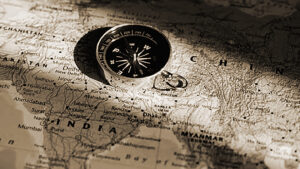Untold Truths About The Internet Blackout
July 26, 2024: The 19th of July, 2024 will forever be remembered as the biggest wake-up call for the human race in the digital age. On that day, we learnt that we’ve handed over far too much power to far too few technology companies, and we’re way too interconnected with them.
The over-connectedness has perhaps reached a point of no return.
Just one cybersecurity company called CrowdStrike goofed up, and the Microsoft Windows operating system crashed in offices worldwide. All hell broke loose. One technical glitch in one corner of the United States of America sent a tsunami all over the world.
Thousands of flights were cancelled. Banking services froze. Hospitals came to a grinding halt. In a few hours’ time on July 19, billions of dollars’ worth of business got wiped out. All because two US companies have too much influence over the world. Human society paid a heavy price for too much digital connectedness, and for allowing too much centralisation of corporate power.
In this special report, we will give you the larger picture of the Microsoft-CrowdStrike disaster. We’ll look at how vulnerable the internet is as a whole, and why we are facing even bigger blackouts. Also, we’ll explore the uncanny and undeniable link between the CrowdStrike incident and the attempted killing of former US president Donald Trump.
Illusion of AI
These days, we’ve been busy celebrating the rise of artificial intelligence and the onset of ChatGPT. We’re engrossed as if a digital revolution is going on. We’re hardly noticing how hi-tech companies are using their popularity and charm to become our masters.
While we’re increasingly relying more and more on Big Tech companies, we’re ignoring an old saying – ‘never put all your eggs in the same basket’. On July 19, the basket fell and we lost all the precious eggs. Too much responsibility was given to CrowdStrike. And too many businesses relied on Microsoft Windows. What happened when they fumbled together? We had a digital earthquake that disrupted life and business.
Suddenly, the world woke up to a harsh reality – that when it comes to the internet, we’re walking on thin ice. We’re too deeply interconnected with enormous technology brands. We’re unaware of the consequences of this over-connectedness.
Businesses and essential services in dozens of countries were knocked out by the Microsoft-CrowdStrike fumble that day, and over the next few days as well. North America, western Europe, and Australia were the worst-affected regions. That’s because businesses in those countries are most overdependent on US tech platforms.
Impact on India
Here in India, most of the disruptions were reported in Dilli and Bengaluru. In these two cities, a vast number of big companies are solely dependent on Microsoft Windows for daily operations.
It’s easy for CrowdStrike and Microsoft to now say they’ve fixed the problem. Silicon Valley will tell us that the past is past, and we need to move on. But it will be a big, bad mistake if we don’t learn any lessons from this episode. That’s because July 19 showed us that far bigger digital disasters can happen if we remain overconnected, and if we stay over-dependent on Big Tech. Here, we’re talking about tech companies such as Alphabet, Amazon, Meta, Microsoft, Apple, Visa, Mastercard, Zoom, Wikipedia, and a few others.
If the blackout of Windows operating system can cause a disaster of this magnitude, think about what’ll happen if other Big Tech services crash.
Take Alphabet, for example. The US conglomerate owns Gmail, Google search, YouTube, Google Maps, GPay, Chrome browser, and Google Meet. What if a glitch someday knocks down Alphabet? Here in India, for personal and even official purposes, we are totally dependent on Gmail. Our confidential material and vitally important data are in our Gmail accounts.
Then, we use Google’s search engine for everything we need, from things we buy to things we want to know. Now just think about what will happen if Alphabet’s platforms face a disruption. Let’s say, a wrong software update crashes Google, just like CrowdStrike’s rogue update had knocked down Windows.
The coming crisis?
Your precious email account will disappear. Your search engine will be gone. Without Google Maps, where will you look for directions? Without YouTube, where will you watch videos and free movies? If Google Meet crashes, countless office meetings will suffer. Companies will race against time, signing up their employees into alternative meeting platforms.
Now think about other tech companies whose services you depend on. Crores and crores of people use the Microsoft Office suite for basic work. Lakhs of offices use Microsoft Teams for meetings. What if those services are suddenly down tomorrow? What happens when the vast working-class suddenly finds that MS Word has disappeared from their computers?
It’ll be the same story with WhatsApp, which is owned by Facebook’s owner Meta Platforms. About 280 crore people in the world use WhatsApp as a messaging platform. In India alone, 54 crore people use WhatsApp. What if this messaging app crashes tonight? It’ll be a huge disruption. Think about the long trail of confidential and important messages you have on your WhatsApp account. You’ll suddenly lose access to it.
Let’s look at possible payment disruptions. What if Visa, Mastercard, and GPay crash? Think about what will happen with millions of transactions around the world. Think about many other apps that you almost can’t live without. Think about life without Wikipedia. Then, there’s Ola and Uber. What about the Android mobile operating system? Or say, Samsung and Apple mobile phones?
What if any one of them crashes one fine morning? Think about the magnitude of the disruptions that will happen. And how can we forget Amazon and Flipkart apps? Or say, Swiggy and Zomato in India. What if these platforms face a blackout? Public life will be disrupted. That’s because we’re overdependent on them.
A world too connected
The scenarios are not just possible, they’re actually probable. Why am I saying this? Just look at who CrowdStrike works with, and you will know how risky the situation is. CrowdStrike, the cybersecurity company based in Texas, has more than 24,000 clients worldwide. Most of them are mid-sized or large businesses.
Do you know who their clients are apart from Microsoft? There is Amazon, Google, Visa, Intel, and several other leading companies. Apart from that, more than 80% of state governments in the US use CrowdStrike for cybersecurity needs. In fact, the national governments of Australia, Germany, and Israel use CrowdStrike for their cybersecurity requirements.
Isn’t that something scary? What if the next glitch at CrowdStrike takes down Visa, Amazon, Google, or say, the computers of some big governments? It’s highly possible because it already happened with Microsoft on July 19.
There’s a an important point that the mainstream media isn’t telling you. Microsoft says 85 lakh Windows computers were disabled by the CrowdStrike glitch. What we’re not being told is that those 85 lakh computers are only 1% of the total number of office-use MS Windows computers in the world.
So, the whole world shook when only 1% of Windows computers were affected. Now, imagine the devastation that could unfold if 20% or 50% Windows machines are disabled by a tech glitch. It only means businesses around the world today are too deeply dependent on MS Windows or Apple’s Mac operating system. The situation is so sensitive that 1% disruption is big enough to cause widespread damage.
Donald Trump Vs CrowdStrike
There’s another uncanny angle to the whole episode. The internet blackout might have something to do with Donald Trump. On July 13, Trump survived an assassination attempt in Pennsylvania. It’s highly likely that unseen controllers or backers of the Democratic Party tried to knock out the Republican candidate ahead of the November election.
Now, in 2019, in case you didn’t notice, Trump had publicly criticised CrowdStrike. Why? CrowdStrike was working as an undercover cyber intelligence organisation. It was working against Trump’s Republican Party at that time. It investigated and exposed that Russian intelligence entities were helping Trump’s election campaign through hacking activities targeting the Democratic Party back in 2016. So, Trump was angered by CrowdStrike’s investigative work during those pre-election days.
Fast forward to the present. Six days after Trump survived a spectacular attempt on his life, his enemy company, CrowdStrike, suffered a big blow. The whole world was told CrowdStrike is the villain behind the July 19 blackout.
So, if you connect the dots, a question naturally comes up – is the CrowdStrike incident related to Trump’s attempted killing? Was CrowdStrike’s humiliation a reaction to Trump’s assassination attempt? We’ll never know these things in black and white. Uncomfortable truths are never spoon-fed; they’re too big to be disclosed. As a critical thinker, you can only research, use your common sense, and connect the dots.
The survivors
Let’s come back to the July 19 shutdown. Did you know that China, Russia, Iran, and North Korea faced very little disruptions that day? The rest of the world was shaken, but these four countries felt only minor tremors. That’s because their governments, their domestic industries, and their citizens hardly use Microsoft products and services.
In fact, they hardly use Western technology services, especially those from the US. There are very few clients of CrowdStrike in these four countries. These governments promote the use of local cybersecurity platforms and locally made tech services. That’s why they were largely insulated from the global digital earthquake.
So, what’s the moral of the story? Do share and adopt technologies from far away. Technology exchange helps society grow. But avoid a situation where tech monopolies from faraway lands dominate every aspect of your life and economy. That’s because when things go wrong, you’ll be left stranded and staring at a blue screen.
(Thanks for reading and sharing the report. For more reports like this one, keep an eye on our website EmpireDiaries.com.)
COPYRIGHT & REPUBLISHING TERMS:
All rights to this content are reserved with Empire Diaries. If you want to republish this content in any form, in part or in full, please contact us at writetoempirediaries@gmail.com.
MORE REPORTS…








